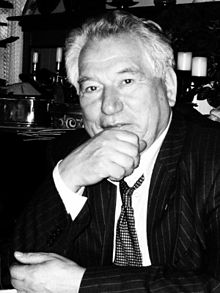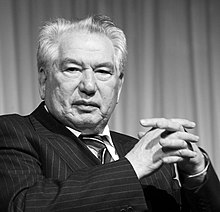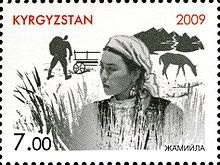Chingis Aitmatov
Chingiz Aitmatov Torekulowitsch ( Kyrgyz Чыңгыз Төрөкулович Айтматов - Tschynggys Törökulowitsch Aitmatov, Russian Чингиз Торекулович Айтматов ; emphasis: Aitmatov * 12. December 1928 in Scheker in Talas -Tal, Kyrgyz ASSR ; † 10. June 2008 in Nuremberg ) was a Kyrgyz writer who wrote mainly in Russian .
Life
| Cyrillic ( Kyrgyz ) | |
|---|---|
| Чыңгыз Айтматов | |
| Latin : | Çıñgız Aytmatov |
| Transcr. : | Chynggys Aitmatov |
| Cyrillic ( Russian ) | |
| Чингиз Торекулович Айтматов | |
| Transl .: | Čingiz Torekulovič Ajtmatov |
| Transcr .: | Tschingis Torekulowitsch Aitmatow |
Aitmatov was born in northern Kyrgyzstan near the Kazakh border in the village of Sheker (Talas region). His father was an administrative officer there, his mother Nagima Chasievna, a native Tatar woman , was an actress at the local theater. In his childhood, like most Kyrgyz people back then, he moved from pasture to pasture with his family and the animals of the clan. In 1937 his father Torekul Aitmatow, who was previously the second secretary of the Kyrgyz Communist Party Central Committee, was arrested for bourgeois nationalism during the Stalinist "purges" and executed in 1938.
Aitmatov began his working life at the age of 14 as an assistant to the secretary of the village council. This was followed by activities as a tax collector, warehouse worker and machinist assistant. Since Kyrgyzstan was a Soviet republic at the time , Aitmatov had the opportunity to study at the newly established Russian school in Scheker and to qualify for a degree. In 1946 he began to study veterinary medicine , first at the technical university in the nearby Kazakh Jambul and then until 1953 at the Kyrgyz Agricultural Institute in Frunze .
His literary activity began in 1951 with translations of Kyrgyz prose into Russian; However, he worked at the Scientific Research Institute of Kyrgyzstan until his first story was published.
In 1956 he began studying at the Maxim Gorki Literature Institute in Moscow , where he lived until 1958. In 1957 he was accepted into the Soviet Writers' Union. He then worked for the party newspaper Pravda for eight years .
Aitmatov has won various prizes, including the 1963 Lenin Prize , the 1968, 1977, and 1983 State Prize. He was also recognized as the national writer of Kyrgyzstan and a hero of socialist work in 1978.
He was a member of the Supreme Soviet of the USSR , a member of the Central Committee of the Communist Party of Kyrgyzstan and a member of the Secretariat of the Writers' Union and the Cinematographers Union, as well as a member of the Presidium of the Soviet Solidarity Committee with the States of Asia and Africa.
Aitmatow was editor-in-chief of the magazine Inostrannaja literatura (Иностранная литература, German 'Foreign literature') and initiator of the international intellectual movement " Issyk-Kul Forum" ( Иссыккульский форум ).
1988–1990 Aitmatov was chairman of the Kyrgyz Authors' Association. During the period of perestroika he was active as a parliamentary representative (Supreme Soviet of the USSR), since the end of 1989 also as an advisor to Mikhail Gorbachev . In 1990 he became the last Soviet ambassador to Luxembourg .
After that he was ambassador for Kyrgyzstan in France and the Benelux countries until March 2008 and lived in Brussels. At the award ceremony of the Aleksandr Men Prize in 1998, he described the development of a peace-loving culture in contrast to the cult of war as the highest task of humanity.
After Aitmatow, who had diabetes, suffered a faint attack while filming in the Volga region in May, he died on June 10, 2008 in the Nuremberg hospital after three weeks of severe pneumonia. He was buried at a state funeral with more than 20,000 visitors on the grounds of the Ata-Bejit memorial .
plant
Aitmatov's first and best-known work is the story Djamila, later successfully filmed, about events in the summer of the war year 1943 in Kyrgyzstan. Louis Aragon translated it into French and wrote in his foreword: "[...] for me it is the most beautiful love story in the world." In the GDR , the work was required reading in schools. Hannes Wader was inspired by her for his song Am Fluss .
On August 31, 1973, an open letter from a group of well-known Soviet writers in connection with the "anti-Soviet acts and appearance of Alexander Solzhenitsyn and Andrei Sakharov " appeared in the party newspaper Pravda , which was co-signed by Aitmatov.
In the course of the 1970s he distanced himself from socialist realism ; his novel Der Richtplatz (also: Die Richtstatt ) gave important literary impulses for perestroika in 1987 .
Kyrgyz tradition and culture play an important role in his stories. Aitmatow describes the contrast between the hard, nature-related life of the former nomad people and the everyday life of the kolkhoz in the Soviet Union with soulful, poetic and narrative power. In his more recent works he consistently criticized human ignorance and the associated destruction of nature. At the request of the Naturschutzbund Deutschland , he took over the patronage of the Association for the Protection of Snow Leopards .
“Thanks to extensive knowledge and the targeted use of many objective laws of the material world, mankind has reached a high level of technical and technological development. In striving to apply the most modern achievements of scientific and technical progress in life, humanity has at the same time lost its spiritual and moral sphere from the field of vision, more precisely: It has largely lost this area, which also exists and develops according to certain laws ignored. These laws are no less objective than those of the material world. In doing so, a fundamental law of the universe was violated, which reads: The level of spiritual and moral development of the human community should always be a little higher than the level of scientific and technical progress. Only then will the great achievements of science and technology also give rise to responsibility for the general well-being of people, for preventing hunger, impoverishment and disease in different parts of the globe. "
Works

Stories and short stories
- Djamila ("Джамиля", 1958)
- Eye to eye ("Лицом к лицу", 1958)
- The camel eye ("Верблюжий глаз", 1961)
- The first teacher ("Первый учитель", 1962)
- The Way of the Reaper / Gold Trail of the Sheaves (1963)
- Farewell to Gülsary / Throw off the fetters, Gülsary ("Прощай, Гульсары!", 1967)
- The white steamer ("Белый пароход", 1970)
-
You my poplar in the red headscarf . Kyrgyz original edition 1970: "Кызыл Жоолук Жалжалым", Russian title: "Тополёк мой в красной косынке", 1970
- German, from Russian by Juri Elperin , Verlag Volk und Welt, (East) Berlin 1986, as a paperback edition: Unionsverlag, Zurich 1992, ISBN 3-293-20006-0 .
- Early cranes ("Ранние журавли", 1975)
- The migratory bird's lament (short stories, 1990)
- The white cloud of Chinggis Khan ("Белое облако Чингисхана", 1990)
- The dreams of the she-wolf (1996)
- Animal stories (from various works) selected by I. Gutschke. Unionsverlag Zürich 2020, 192 pp., ISBN 978-3-293-00560-0
Novels
- The boy and the sea (other title: piebald dog running along the sea ) ("Пегий пес, бегущий краем моря", 1977)
- A day longer than life ("И дольше века длится день", 1981, later also "Буранный полустанок"), published in the GDR in 1982 under the title The day draws the century path . The novel was later expanded by a chapter and published under One day longer than a life , ISBN 978-3-293-20262-7 .
- The Richtstatt (West German title: Der Richtplatz ) ("Плаха", 1986)
- The Kassandra painting ("Тавро Кассандры", 1994)
- The snow leopard ("Когда падают горы (Вечная невеста)", literally When the mountains fall (The Eternal Bride) , 2006)
Dramas
- The ascent to Mount Fuji ("Восхождение на Фудзияму", 1973, with Kaltai Muchamedschanow )
Others
- Responsibility for the future . Article (1967)
- Do you think the Russians want war? Soviet writers on war and peace . (Ed.) (1988)
- Encounters on Mount Fuji. A dialogue with Daisaku Ikeda (1992)
- Declaration of love to the blue planet - encounter with Baha'i . Essays and Conversations (1993)
- Childhood in Kyrgyzstan. Memories (1998)
Film adaptations
- 1963: Sultry (Зной) - Director: Larissa Schepitko (based on the novel The Camel Eye )
- 1966: The First Teacher (Первый учитель) - directed by Andrei Konchalovsky
- 1969: Farewell to Gulsary (Бег иноходца) - Director: Sergei Urussewski
- 1969: Longing for Djamila (Джамиля) - Director: Irina Poplawskaja
- 1975: The Red Apple (Красное яблоко) - Director: Tolomusch Okejew
- 1976: The White Steamer (Белый пароход) - Director: Bolot Schamschijew
- 1978 Selvi Boylum Al Yazmalım (Topolëk moj v krasnoj kosynke) - Director: Atıf Yılmaz
- 1979: Early Cranes (Ранние журавли) - Director: Bolot Schamschijew
- 1988: The Sandstorm (Смерч) - directed by Bako Sadykow
- 1989: The Piebald Dog (Пегий пес, бегущий краем моря) - directed by Karen Geworkjan
- 1990: Mankurt (Манкурт) - Director: Hojaguly Narlyýew
Radio play versions
- 1963: The Camel Eye Fountain (Зной) - adaptation: Heiner Müller , director: Fritz Göhler (based on the novella Das Camelauge ) - GDR radio
- 1970: The Street of the Sower - Director: Werner Grunow - Rundfunk der DDR
- 1976: The Ascent to Fudschijama - adaptation and dramaturgy: Mechthild Schäfer, director: Peter Groeger - Rundfunk der DDR, first broadcast canceled and only 13 years later, in December 1989.
- 1980: Early Cranes (Ранние журавли) - Director: Horst Liepach - Rundfunk der DDR
- 1985: Tschypalak, der Täumling - Director: Norbert Speer - Rundfunk der DDR
- 1986: The Rise of Mount Fuji - Director: Otto Draeger - SWF
- 1988: The Song of the Owl Lua - Director: Achim Scholz - Rundfunk der DDR
Audio books
- The boy and the sea , read by Gert Westphal , Hamburg, Litraton, 1996, 4 CDs, ISBN 3-89469-923-X
- Dshamilja , read by Gert Westphal, Hamburg, Litraton, 1997, 2 CDs, ISBN 3-89469-928-0
- The first teacher , read by Harald Eggebrecht , Munich, Kunstmann, 2001, 2 CDs, ISBN 3-88897-289-2
- You my poplar in a red headscarf , read by Rudolf Kowalski and Günter Lamprecht , Berlin, Der Audioverlag, 2003, 2 CDs, ISBN 3-89813-256-0
- Dshamilja , Ulrich Matthes reads Aitmatow, Munich, Süddeutsche Zeitung, 2006, 3 CDs, ISBN 978-3-86615-364-6
- The white steamer , read by Dieter Wien , Hamburg, GoyaLit, 2007, 4 CDs, ISBN 978-3-8337-1884-7
- The snow leopard , read by Dieter Wien, Hamburg, GoyaLit, 2007, 6 CDs, ISBN 978-3-8337-1856-4
- Dshamilja : a staged reading with Thomas Rühmann and Tobias Morgenstern , Berlin, BuschFunk, 2013, 1 CD, ISBN 978-3-944058-29-0
- A day longer than a life , read by Uwe Friedrichsen , Der Audio Verlag Berlin 2018, 1 mp3CD, ISBN 978-3-7424-0422-0
literature
- Boris Chlebnikov and Norbert Franz: Cingiz Ajtmatov. Munich: Ed. Text and criticism. 1993, ISBN 3-88377-409-X
- Irmtraud Gutschke : Human issues , fairy tales, myths. On the work of Tschingis Aitmatov. Hall u. a .: Mitteldeutscher Verlag. 1986, ISBN 3-354-00091-0
- Erika Haber: The myth of the non-Russian. Iskander and Aitmatov's magical universe. Lanham, Md. U. a .: Lexington Books. 2003, ISBN 0-7391-0531-0
- Harri Jünger: Čingiz Ajtmatov i vosprijatie ego proizvedenij v GDR. In: Zeitschrift für Slawistik, 1986, no. 3, pp. 337-340.
- Harri Jünger: The literary impact strategy of Čingiz Ajtmatov. In: Journal for Slavic Studies. 1987, no. 5.
- Harri Jünger: The writer poetics of Čingiz Ajtmatov and his novel "Placha". In: Zeitschrift für Slawistik, 1988, no.1.
- Michael Martens: My goal in life is to create. A conversation about the person and the time with Tschingis Aitmatow. Winsen / Luhe u. a .: Boldt. 1998, ISBN 3-928788-26-4 .
- Robert Porter: Four contemporary Russian writers. Oxford et al. a .: mountain. 1989, ISBN 0-85496-246-8 .
- Irmtraud Gutschke: The promise of the cranes - traveling in Aitmatow's world . Mitteldeutscher Verlag, Halle (Saale) 2018, ISBN 978-3-96311-021-4 , second supplemented edition. Hall 2020
- Irmtraud Gutschke: Essay. In: Tschingis Aitmatow animal stories . Unionsverlag Zurich 2020, ISBN 978-3-293-00560-0
- Bärbel Henniger: “Ascent to Mount Fuji. For Tschingis Aitmatov's 60th birthday on December 12th “In: Neue Berliner Illustrierte 49/88, pp. 24–31
Awards
- 1968, 1977 and 1983 State Prize of the USSR
- 1998 Alkesandr Men Prize: From the speech of the prize winner
- 2006 Officer of the Hungarian Order of Merit
Web links
- Literature by and about Tschingis Aitmatow in the catalog of the German National Library
- Works by and about Tschingis Aitmatow in the German Digital Library
- Tschingis Aitmatow in the Internet Movie Database (English)
- Works by and about Tschingis Aitmatow at Open Library
- The bibliographic database RussGUS contains several hundred references (search for: ajtmatov * OR aitmatow *).
- Ruth Weiss: The place of execution. Legends and religious motifs in Tschingis Aitmatov's work - with reviews of the novels Farewell to Gülsary , The White Steamer , A Day Longer Than Life and The Place of Justice
- Review of the novel The Snow Leopard in Eurasian Magazine
- Tschingis Aitmatow on culturebase.net
Individual evidence
- ↑ From the award winner's speech , Academy of the Diocese of Rottenburg-Stuttgart, Aleksandr Men Prize 1998, awarded to Tschingis Aitmatow. Speech of the award winner
- ↑ Tagesspiegel : "Tschingis Aitmatow is dead" , June 10, 2008
- ↑ More than 20,000 say goodbye to Tschingis Aitmatow | NZZ . June 14, 2008, ISSN 0376-6829 ( nzz.ch [accessed November 16, 2019]).
- ↑ Louis Aragon in the foreword (translated by Traugott König ) to Tschingis Aitmatow: Dshamilja. Translated from the Russian by Gisela Drohla . Library Suhrkamp 315, Frankfurt am Main 1986, p. 7.
- ↑ Pravda, August 31, 1973, p. 3.
- ↑ NABU press service: “The Snow Leopard” - reading tour by Tschingis Aitmatow. March 16, 2007, accessed October 13, 2016 .
- ↑ http://www.umweltdebatte.de/aitmatow-2007.htm
- ^ Speech at the ETH Zurich in 2000
- ↑ For Sunday, March 28, 1976, 8 p.m., the first broadcast of the radio play “The Ascent to Fudschijama” based on Tschingis Aitmatov's then latest stage play was announced in the program magazine “FF-Hier” for the cultural program “Radio DDR II”. The radio play was produced in January 1976 with a top-class cast - including Jutta Hoffmann , Kurt Böwe and Jürgen Hentsch - directed by Peter Groeger and with radio play music by Reiner Bredemeyer . But on the said Sunday evening, the evening speaker briefly warned the audience of a change in the program and was offered a repeat of Alexander Gelman's production piece “Minutes of a Meeting”. The original broadcast of the Aitmatov drama “The Ascent to Fudschijama” had been banned at short notice by an instruction from the SED Central Committee. When the chairman of the radio committee, Rudi Singer , referred to the fact that Aitmatov's text had appeared as a book in a selection of Soviet time pieces in 1975 by the GDR publisher Volk und Welt, the Central Committee replied that the release for a book still meant Far from saying that the work can be distributed in a mass medium. The tapes with the radio play staging disappeared in the safe of the then head of the radio drama department - Hans Bentzien . He and the staff involved in the production were reprimanded. In the midst of the Brezhnev Doctrine, Aitmatov's memories of the grave injustice of the Stalin era were not intended to reach a wide audience. It was not until after the fall of 1989 that the production had its actual radio premiere on the radio of the GDR on December 20, 1989. Before that, the play had its GDR premiere at the theater in January 1986 in the Schauspielhaus Leipzig with a ten-year delay. see Hans Bentzien: My Secretaries and I , Verlag Neues Leben, Berlin 1995, p. 262ff.
| personal data | |
|---|---|
| SURNAME | Aitmatov, Tschingis |
| ALTERNATIVE NAMES | Aitmatow, Tschingis Torekulowitsch (full name); Айтматов, Чыңгыз (Kyrgyz); Aytmatov, Çıñgız (Transliteration of Kyrgyz); Aitmatow, Tschynggys (transcription of the Kyrgyz language); Айтматов, Чингиз Торекулович (Russian); Ajtmatov, Čingiz Torekulovič (transliteration of Russian); Aitmatow, Tschingis Torekulowitsch (transcription of Russian) |
| BRIEF DESCRIPTION | Kyrgyz writer |
| DATE OF BIRTH | December 12, 1928 |
| PLACE OF BIRTH | Scheker , Kyrgyzstan |
| DATE OF DEATH | June 10, 2008 |
| Place of death | Nuremberg |


